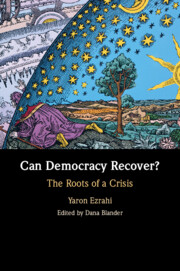Book contents
- Can Democracy Recover?
- Can Democracy Recover?
- Copyright page
- Dedication
- Contents
- Preface
- Words from the Author
- Introduction
- Part I The Rise of Western Politics following the Collapse of the Monistic Medieval Cosmology
- 1 Nature as the Transcendental Imaginary of Modern Secular Society
- 2 The Rise of the Western Nature/Culture Dualistic Cosmology from a Comparative Perspective
- 3 Risks and Opportunities Inherent in the Unstable Demarcation Lines between Nature and Culture
- Part II The Emergence of the Epistemological Constitution of Modern Democracy
- Part III The Dialectics of Objectification
- Part IV The Erosion of the Epistemological Constitution of Modern Democracy
- Part V Democracy beyond Modernity
- Can Democracy Recover? Concluding Reflections
- Epilogue
- Index
3 - Risks and Opportunities Inherent in the Unstable Demarcation Lines between Nature and Culture
from Part I - The Rise of Western Politics following the Collapse of the Monistic Medieval Cosmology
Published online by Cambridge University Press: 02 January 2025
- Can Democracy Recover?
- Can Democracy Recover?
- Copyright page
- Dedication
- Contents
- Preface
- Words from the Author
- Introduction
- Part I The Rise of Western Politics following the Collapse of the Monistic Medieval Cosmology
- 1 Nature as the Transcendental Imaginary of Modern Secular Society
- 2 The Rise of the Western Nature/Culture Dualistic Cosmology from a Comparative Perspective
- 3 Risks and Opportunities Inherent in the Unstable Demarcation Lines between Nature and Culture
- Part II The Emergence of the Epistemological Constitution of Modern Democracy
- Part III The Dialectics of Objectification
- Part IV The Erosion of the Epistemological Constitution of Modern Democracy
- Part V Democracy beyond Modernity
- Can Democracy Recover? Concluding Reflections
- Epilogue
- Index
Summary
The chapter explores the dualistic cosmology of Nature/Culture and its influence on individual and collective behavior narratives. It presents various instances of disputes and debates that underscore the indistinct boundaries between Nature/Culture and between determinism and choice. These include the IQ controversy, genetic engineering, human perfectibility, global warming, the Pygmy tribe categorization debate, and the self-definition of groups in organic/biological versus associative/cultural terms. These discussions highlight the complexities in delineating Nature/Culture boundaries. Ezrahi suggests that the inherent ambiguity in demarcating Nature from Culture has, from a liberal open-ended worldview, engendered undecidability between such competing frames. This ambiguity has opened up possibilities to leverage the authority of Nature to either strengthen or weaken that of Culture and politics and vice versa. It has also enabled the blending of both in varying degrees in fields like technology, medicine, and arts. The chapter further explores the ongoing debate on whether the Holocene epoch of an independent Nature is giving way to the Anthropocene era characterized by significant human impact on Nature’s form. Ezrahi proposes a hybrid perspective of Nature as both separate from humans and humanized, questioning the sustainability of modern democracy’s epistemological constitution premised on an autonomous Nature.
- Type
- Chapter
- Information
- Can Democracy Recover?The Roots of a Crisis, pp. 31 - 36Publisher: Cambridge University PressPrint publication year: 2025

